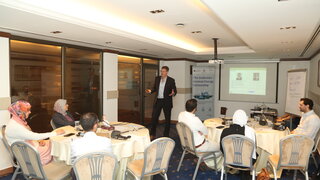The socioeconomic aspects of renewable energy and energy efficiency

The transition to a green, low-carbon economy, also known as the "energy transition," generates more jobs than economies that rely on carbon-intensive energy generation. For example, the renewable electricity sector generates roughly two to fifteen times the number of jobs as gas power plants with the same generation capacity and up to four times the number of jobs as traditional coal-fired power plants. Furthermore, approximately one-third of all employees working in the renewable sector worldwide are women. In comparison to the conventional oil and gas-based energy sector, where only 22% of the workforce is female, this makes the field more gender-balanced.
The Jordanian-German Energy Partnership in cooperation with eclareon provided a socioeconomic training to key stakeholders in different public sector institutions such as Ministry of Energy and Mineral Resources (MEMR), Ministry of Transport (MoT) and Greater Amman Municipality (GAM).
The training builds the capacity in modelling and simulating climate change and adaptation and mitigation measures, as well as the employment rate in the energy sector. The training aims to better inform decision-makers of socioeconomic modelling.
The training was over the period of 5 days, that included an interactive session. The attendees were divided into groups to model exercises using the modeling tool. The sessions were concluded with a discussion among participants, determining the best practice that the model users will do, and the importance of implementing it, and the importance of updated data.